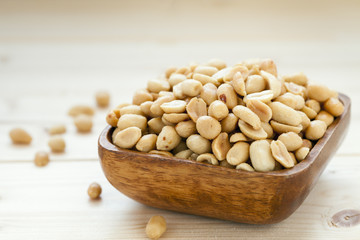
BLANCHED
Types of Blanched Peanuts :
- Whole Blanched Peanuts: Complete peanuts with the skin removed, perfect for various culinary uses.
- Blanched Peanut Splits: Peanuts split into halves, commonly used in processed food items.
- Blanched Peanut Granules: Small, chopped pieces of peanuts used as toppings and in baking.
- Blanched Peanut Flour: Finely ground blanched peanuts ideal for gluten-free baking and protein-rich recipes.
Specifications of Blanched Peanuts :
- Size: Available in 38/42, 40/50, 50/60 counts per ounce.
- Color: Off-white, uniform without the natural reddish-brown skin.
- Moisture Content: Typically maintained below 5% for optimal shelf life.
- Oil Content: Around 45-52%, providing a rich flavor profile.
- Aflatoxin: Monitored to meet international safety standards.
- Processing: Mechanically blanched to ensure even removal of skin without compromising the nut’s integrity.
Uses of Blanched Peanuts :
- Snacks: Roasted or flavored as standalone snacks.
- Confectionery: Used in making candies, peanut brittle, and granola bars.
- Baking: Added to cookies, cakes, and bread for enhanced taste and texture.
- Culinary Dishes: Incorporated into sauces, curries, and salads.
- Peanut Butter: A primary ingredient in smooth peanut butter production.
Features of Blanched Peanuts :
- Skin-Free: Easy to digest and process without the fibrous skin.
- Consistent Taste: Offers a milder flavor compared to raw peanuts.
- High Protein Content: Provides essential nutrients for a balanced diet.
- Versatile: Suitable for both savory and sweet applications.
- Long Shelf Life: Stays fresh when stored properly in cool, dry conditions.
Packaging for Blanched Peanuts :
- Bulk Packaging: 25 kg or 50 kg PP (Polypropylene) bags for large-scale buyers.
- Retail Packaging: Available in vacuum-sealed packs ranging from 250g to 1 kg to maintain freshness.
- Custom Packaging: Options for private labeling as per client requirements.
- Protective Measures: Packed in moisture-proof, food-grade materials to prevent contamination and maintain quality.
- Storage Tips: Best stored in a cool, dry place away from direct sunlight to extend shelf life.





